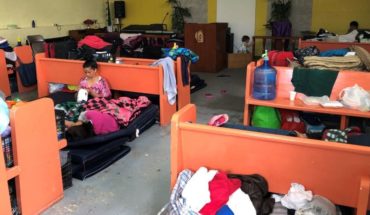“Last week it was a team of (the ministries) Sernameg, the Segpres and Justice to Buenos Aires and Mendoza to look at how the monitoring center for precautionary measures, which are for extreme violence, is working, and they brought very important information. Argentina will help us to implement the system because it is a system that requires special precision in order not to generate false security on the victim. We hope to have a pilot soon in some region of the country,” said The Minister for Women and Gender Equity, Isabel Plá, this morning.
“People know it as electronic anklet, but we’re evaluating whether the victim and the aggressor have to have a device, so we’re evaluating that and also mimicking the system that’s being applied today in Argentina,” he said on Radio Universo. “Once we have the technical issue resolved, the Government will put urgency to the bill because we need a system that works perfectly: that protects the victim, that persecutes the aggressor and also there has to be a center that will caulome what is going on and hag to the necessary alerts and alert the police because we don’t get anything out of having the victim monitored if we are not able to rescue it.”
It clarified that the technical and legal aspects should be studied in order to determine the best model to implement in the country, which ensure compliance with the orders prohibiting the approach to the victim. This is because one of the main weaknesses of the current system is that there is no efficient way to monitor and enforce this precautionary measure.
One of the aspects to be resolved is whether anklets can be implemented via decree or through a law. “There are also legal doubts, in the sense that we are monitoring defendants so there are some specialists who say that if the crime is not yet proven, a person cannot be monitored” of this type, he clarified. “We believe that we need to move forward with the Law – which is in the second proceeding – once we have resolved the operational and I think it is very important that we have the monitoring of the precautionary measure also cautious in a Law of the Republic.” “I hope the Pilot Plan will leave soon and we will announce it with great optimism,” he concluded.
On the known cases last weekend, where there were two femicides and subsequent suicide of the attacker, the minister noted that there is “a very unknown data: approximately 50% of the femicidal people commit suicide in Chile and the world… Secondly, who takes care of the children? That is the responsibility of the Ministry of Justice and the Undersecretariat of Children. To begin the care is assumed by a direct relative, the grandparents (almost always maternal) then the court sentences personal care, secondly the Sename has external spaces of psychological support and accompaniment to children who face situations of this nature, but no treatment, no matter how sophisticated it will erase that footprint or that history, what you have to do is teach them to live in that deep pain and that they are adults who always condemal with violence.”
“We in the Sernameg have constant coordination with the Undersecretariat for Children and with the Sename regarding these children and also many children who live in foster homes with their mother. We have more than 40 foster homes in Chile, with reserved locations because they have protective measures and the women who are there and have children under the age of 12 live there, there is also a public offer to help get those children through,” he added.
“We need to consolidate a policy against violence against women that is not only about women but also their environment. We have made good progress as a country in recent years, but there is still a lot of experience in other countries that we consider implementing, even in Argentina that goes steps ahead of us as a country.”
Punishing
“The graduates today can have the highest sentence that is qualified perpetual, which means that just after 40 years in prison, the person can apply for parole, that is, practically impossible. What we are going to do, we are going to start a study of each of the victims of femicide since the enactment of the 2010 Act until now and one of the elements that we are going to study is the sentences that have served the femicidals who have survived their own crime” Pointed out. “Everyone is supposed to be serving a penalty because the minimum floor for femicides is 15 years, but it is important that we see on a case-by-case basis and we also want to have a history of other elements surrounding a femicide that are very important to have in change laws and policies and better prevent.”





